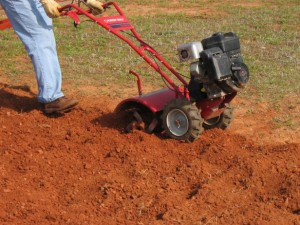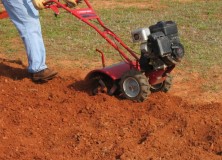 Yeah, I got a thing for growing vegetables.
Yeah, I got a thing for growing vegetables.
You’re probably going to see more of these posts in the coming months, so if they’re too boring, don’t read ‘em…
Planning in advance is essential for a successful garden.
- Do you have enough sun exposure? Vegetables love the sun. They need at least 6 hours of full sun every day, and preferably 8.
- Know your soil. Most soil can be enriched with compost and be fine for planting, but some soil needs more help. Vegetables must have good, loamy, well-drained soil. Check with your local nursery or local cooperative extension office about free soil test kits so that you can assess your soil type.
- Placement is everything. Avoid planting too near a tree, which will steal nutrients and shade the garden. In addition, a garden close to the house will help to discourage wild animals from nibbling away your potential harvest.
- Vegetables need lots of water, at least 1 inch of water a week.
- You’ll need some basic planting tools. These are the essentials: spade, garden fork, garden hose, hoe, hand weeder, and wheelbarrow (or bucket) for moving around mulch or soil. It’s worth paying a bit extra for quality tools.
- Study seed catalogs online to see all the varieties available. If ordering online, order early!
- Check your frost dates. Find first and last frost dates in your area and be alert to your local conditions.
Fencing is recommended. 2′ high chicken wire will prevent rabbit entry and West Easton does have a lot of rabbits. If you have seen deer entering your yard, a minimum of 4′ is necessary, but the higher the better, as a determined deer is hard to stop and chicken wire won’t suffice. Fencing that deter deer is expensive, but ultimately worth the price. One deer can eat all the young plants in a small garden in just one evening.
You will have to decide between tilling your yard, or a raised bed. If you have poor soil or a bad back, a raised bed built with non-chemically treated materials (like cinder block or brick) offers many benefits. Pressure treated wood is not recommended due to the leaching of the chemicals into the soil, which can kill your plants, or be transferred to you when vegetables are consumed. Untreated wood will work, but may need to be replaced about every 3 years. A raised bed system, once installed and filled with quality compost soil often return a better yield of vegetables.
With tilling, you save the expense and time of building raised beds, but be aware the first time tilling grass sod can be difficult and is not recommended to be done by hand, or with a small tiller designed for established gardens. The grass will have a deep root system and the soil will be well compacted, making tilling difficult. It’s best to rent a large tiller from Home Depot or Lowes that they recommend for turning over an established lawn.
Here’s hoping I see some new gardens this year!
Disclaimer: On January 4, 2016, the owner of WestEastonPA.com began serving on the West Easton Council following an election. Postings and all content found on this website are the opinions of Matthew A. Dees and may not necessarily represent the opinion of the governing body for The Borough of West Easton.







